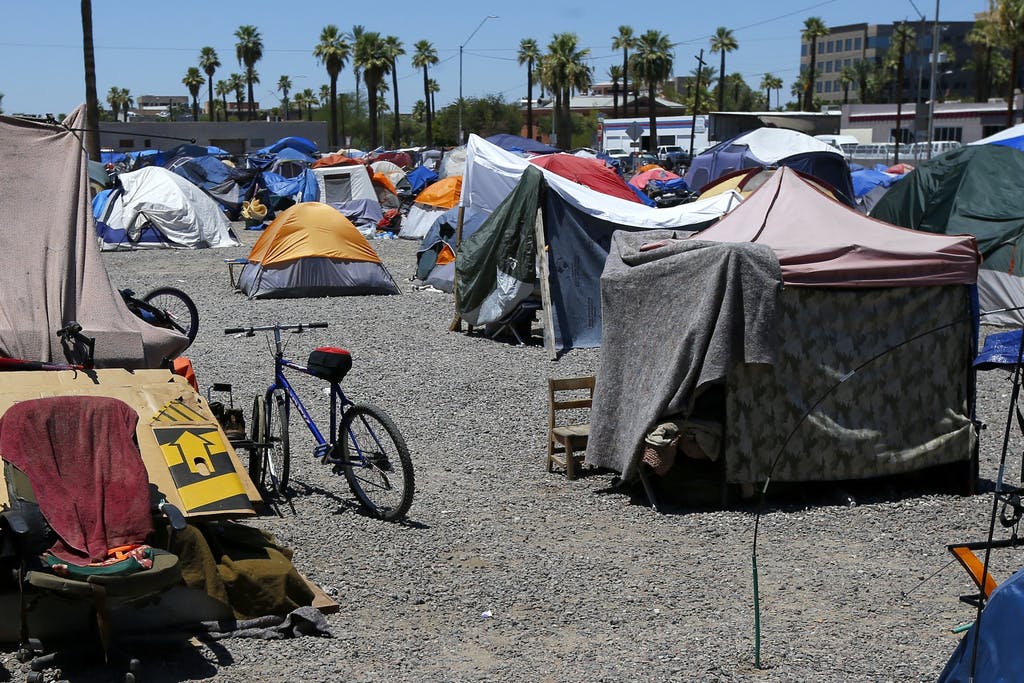Arizona Could Become First State To Compensate Residents, Business Owners for Property Damage Caused by Homeless Nuisances
‘The primary purpose of paying property taxes is for public health and safety services,’ a backer of the reform tells the Sun, and if a city doesn’t provide them, ‘they shouldn’t be allowed to kind of take those funds.’

As residents and business owners grow increasingly frustrated with open drug use, public urination, and panhandling affecting their properties, Arizona’s voters will consider a ballot measure to refund property taxes to taxpayers affected by homeless nuisances — a first-of-its-kind effort that could serve as a model to states across the country.
The state’s legislature approved a tax reform ballot measure this week that will now head to the general election ballot. It would hold cities accountable for not enforcing ordinances that ban illegal public camping, loitering, panhandling, illicit drug use, and public urination and defecation.
If passed by voters, the reform effort — first drafted by a public policy think tank, the Goldwater Institute — would allow Arizona property owners to be compensated for expenses they’ve incurred as a result of the city’s inability to curtail the homeless crisis. Refunds would be capped at the amount the resident or business owner paid in property taxes the previous year.
“The primary purpose of paying property taxes is for public health and safety services, and if the city is going to be derelict in providing those services, then it seems that they shouldn’t be allowed to kind of take those funds,” Goldwater Institute’s director of government affairs, Jenna Bentley, tells the Sun, adding that the reform wouldn’t disrupt the process of collecting and distributing property taxes.
Arizona’s legislation comes as record-high numbers of homeless individuals and sprawling encampments are weighing on cities across the country, even prompting the Supreme Court to soon take up the issue of whether it’s an Eighth Amendment violation for cities to arrest people violating public camping bans.
Phoenix was entangled in a months-long dispute over a sprawling homeless encampment called “The Zone,” which the city was court-ordered to clear last year after nearby property owners filed a lawsuit. Court documents described burning bodies, biohazardous waste, and rampant public drug use at the site, as the Sun reported.
“The Zone” was unique because the city of Phoenix not only enabled — but actively encouraged — it to grow to more than 1,000 homeless individuals, Ms. Bentley says, as police were told not to respond to calls and were directed to drop off homeless people from other parts of the city into the area.
If approved by voters, Arizona’s ballot measure would allow a property owner to submit proof of expenses incurred as a result of homeless nuisances to the state’s Department of Revenue, which would notify the city or town, Ms. Bentley says. Arizona has a unique state shared-revenue program that serves as a sort of “master pot,” she adds, with municipalities getting portions of the revenue based on populations.
“What happens is the funds that the Department of Revenue sends to the property owner are deducted out of what the offending municipality would have received in state shared revenue,” she says. A city can ignore a claim, which automatically approves the refund, or it can challenge, which would give a taxpayer standing to take it to court.
A representative of the League of Arizona Cities and Towns, Tom Savage, testified in opposition to the legislation, saying that the issue of homelessness is more “legally complex than what this measure considers.”
“It will not solve the homelessness crisis or make homeless encampments go away,” he said. “That is because all government entities in the western U.S. are currently constrained by Ninth Circuit Court decisions that interpret the Eighth Amendment as generally prohibiting the enforcement of local public camping laws if there’s no adequate shelter space available.”
Court decisions have tied cities’ hands, making handling homelessness a “legal tightrope,” he said, and it’s an “evolving area of the law which confuses local enforcement and frustrates action to address health and safety issues.” Acknowledging frustration from residents, he added that taking money away from cities could make encampments worse.
The legal argument is a “red herring,” Ms. Bentley responds, adding that the issues in the upcoming Supreme Court case on homelessness are not “at play here.”
“There’s nothing in this language that says you have to arrest someone, we’re not trying to criminalize homelessness in this,” she says. “I think that’s just an easy way for them to cop out to say, ‘Oh our hands are tied, we can’t do anything,’ when that’s simply not factually accurate,” she adds, pointing to the fact that the city was able to clean up the encampments in the past and is not helpless when it comes to addressing homelessness.
Representatives of the city of Phoenix were not immediately responsive to requests for comment.

